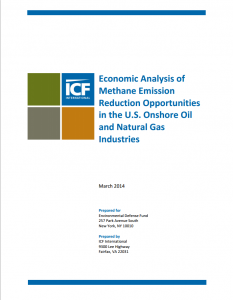Full Title: Economic Analysis of Methane Emission Reduction Opportunities in the U.S. Onshore Oil and Natural Gas Industries
Author(s): ICF International
Publisher(s): ICF International
Publication Date: March 1, 2014
Full Text: Download Resource
Description (excerpt):
Methane is an important climate change forcing greenhouse gas (GHG) with a short‐term impact many times greater than carbon dioxide. Methane comprised 9% of U.S. greenhouse gas (GHG) emissions in 2011 according to the U.S. EPA Inventory of US Greenhouse Gas Emission and Sinks: 1990‐20111, and would comprise a substantially higher portion based on a shorter timescale measurement. Recent research also suggests that mitigation of short‐term climate forcers such as methane is a critical component of a comprehensive response to climate change2 . Emissions from the oil and gas industry are among the largest anthropogenic sources of U.S. methane emissions. At the same time, there are many ways to reduce emissions of fugitive and vented methane from the oil and gas industry and, because of the value of the gas that is conserved, some of these measures actually save money or have limited net cost.
Environmental Defense Fund (EDF) commissioned this economic analysis of methane emission reduction opportunities from the oil and natural gas industries to identify the most cost‐effective approaches to reduce these methane emissions. The study projects the estimated growth of methane emissions from these industries through 2018 as a future date at which new emission reduction technologies could be installed. It then identifies the largest emitting segments and estimates the magnitude and cost of potential reductions achievable through currently available technologies.
